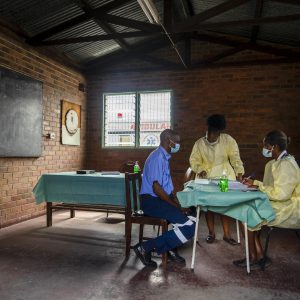Decent and dignified healthcare for all
The proposed National Health Insurance scheme is, in principle, an excellent initiative. The problem is that no one in their right mind trusts the ANC to implement it.
Author:
3 June 2022

Any decent society should strive to ensure that there is universal healthcare of the best possible quality. Universal healthcare is not a luxury only available to wealthy societies. As the examples of Cuba and the state of Kerala in India show, impressive progress can be made when there is sufficient political will.
It’s equally true that the decisive factor determining whether or not there is meaningful progress in public education, transport and housing, as well as with projects like land reform, is political will. It goes without saying that the ANC has systematically failed to generate and sustain the political will required to make good on the promises it committed to in the Freedom Charter in 1955. In the current moment the intersection between austerity and various modes of turning the state into an instrument of private accumulation is worsening the situation.
When a ruling party is unable to advance a social agenda, it is often possible to generate the energies and pressures required to move forward from within society. This was achieved by the Treatment Action Campaign (TAC), which, despite intense hostility from Thabo Mbeki and others, was able to link with other organisations, build a moral consensus around the need to provide medication for people living with HIV and Aids, forge alliances with progressives inside the ANC and make massive social gains.
Related article:
The TAC is an outlier in many respects, one of which is that, over the past two decades, organisation independent from the ANC and from below has typically been met with repression, some of it severe to the point of being murderous. Nonetheless, the achievements of the TAC stand as a compelling practical example of what can be achieved.
Today the state of the railways, public schools and hospitals are all too eloquent testimony to the sheer contempt that both the dominant factions of the ANC share for ordinary people. The middle classes and elites have been able to buy their way out of this contempt by choosing, wherever possible, to be consumers rather than accept profoundly degraded ideas of citizenship. They live in gated communities, hire private security, send their children to private schools, use private healthcare and socialise in shopping malls or other privately gated and secured spaces.
For many, their hold in this realm of commodified exit from state failure is tenuous, and as food and fuel prices escalate and retrenchments continue, large numbers of families are a missed pay cheque away from having to slip back into state-run schools, hospitals and all the rest.
Moral urgency
Discussions this week in Parliament have brought the ANC’s long-standing commitment to develop a National Health Insurance (NHI) scheme back to public attention. The moral argument for an NHI could hardly be more urgent, and it goes beyond the imperative to ensure decent healthcare for all by socialising the full range of medical resources and skills available in society. We know that when the middle classes and elites share access to services such as healthcare with others, the pressure to sustain the quality of those services rises. We also know that while initial resistance is to be expected from elites when there are proposals to socialise access to resources, in the end shared access to everything from public spaces to hospitals builds social solidarity.
But given the current state of public health, the Life Esidimeni scandal and the staggering speed and scale with which the emergency funds allocated at the beginning of the Covid pandemic were looted, a lack of trust in the ANC’s commitment to run a public health system with integrity is entirely justified. This is compounded by the ominous fact that the first tender to publicise the NHI, the now notorious Digital Vibes contract, was itself subject to predation.
Related article:
So, what is to be done?
Current trends seem to indicate that there is a significant chance that the ANC will not be able to win an outright majority in the next national election. But the set of smaller parties vying to take the space opening up as the ANC’s legitimacy collapses, including organisations marked by demagogic leadership and already compromised by serious corruption, as well as right-wing formations hostile to even basic social democratic values, offer scant grounds for hope that the election will resolve things.
A new health movement
What is required is mass organisation that is simultaneously against corruption and for real social advances in areas such as health. But it is important to be mindful that anti-corruption politics on its own can easily slip into support for the Right, ranging from austerity to authoritarian demagoguery. For this reason it is essential that commitment to winning clearly elaborated social gains must be the primary goal. We need to centre a commitment to decent and dignified healthcare for all, and allow opposition to corruption to follow from that commitment.
Related article:
It is time for progressive healthcare professionals to organise themselves, affirm universal access to quality healthcare as an unqualified right, and build connections with trade unions and other membership-based organisations with the aim of generating the political will for change outside of the state and the political parties currently in Parliament. There is nothing utopian about this. The TAC has shown what can be achieved.



